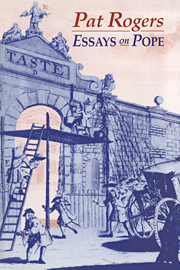Book contents
- Frontmatter
- Contents
- Preface
- Acknowledgements
- List of abbreviations
- 1 Pope and the syntax of satire
- 2 The politics of style
- 3 Form and pattern in the Pastorals
- 4 Windsor-Forest, Britannia and river poetry
- 5 Faery lore and The Rape of the Lock
- 6 Timon's Villa and Chatsworth
- 7 A drama of mixed feelings: the Epistle to Arbuthnot
- 8 The name and nature of Dulness: proper nouns in The Dunciad
- 9 Pope and the social scene
- 10 Blacks and poetry and Pope
- 11 The case of Pope v. Curll
- 12 Pope and his subscribers
- 13 The Burlington circle in the provinces: Pope's Yorkshire friends
- 14 Pope and the antiquarians
- Index
8 - The name and nature of Dulness: proper nouns in The Dunciad
Published online by Cambridge University Press: 18 December 2009
- Frontmatter
- Contents
- Preface
- Acknowledgements
- List of abbreviations
- 1 Pope and the syntax of satire
- 2 The politics of style
- 3 Form and pattern in the Pastorals
- 4 Windsor-Forest, Britannia and river poetry
- 5 Faery lore and The Rape of the Lock
- 6 Timon's Villa and Chatsworth
- 7 A drama of mixed feelings: the Epistle to Arbuthnot
- 8 The name and nature of Dulness: proper nouns in The Dunciad
- 9 Pope and the social scene
- 10 Blacks and poetry and Pope
- 11 The case of Pope v. Curll
- 12 Pope and his subscribers
- 13 The Burlington circle in the provinces: Pope's Yorkshire friends
- 14 Pope and the antiquarians
- Index
Summary
That Pope has a special way with proper names has been observed before now. And indeed a usage as idiosyncratic as ‘Sternhold himself he out-Sternholded’ cries aloud for comment. One does not have to be a grammarian to discern the interest of a line like
And call her Angel! Goddess! Montague!
Nor to respond with delight and quickened attention to a number of parallel constructions (‘ … nine such Poets made a Tate’). However, such observations have never been enlisted in the service of any account of Pope's wider aims. I shall seek to show that Pope characteristically exploits a penumbra of doubt which surrounds proper nouns used in this way. He deliberately blurs the status of such nouns in order to reinforce certain thematic and satiric motifs. Above all, The Dunciad can be seen to derive much of its imaginative density from this trick.
In this one instance we do have a pointer from previous criticism. Aubrey Williams has demonstrated how Pope employs the word ‘Heidegger’ (spelt in fact with the last two letters reversed, I, 290) to convey the sense of a mythical beast rather than that of the actual showman. ‘Never again, inside the poem, can the name refer solely and strictly to the historical Heidegger.’ With Theobald the case is much the same, but it is more intensively worked by Pope. In Williams' terms, ‘The important thing is that a “Tibbald” has never been defined … The Tibbald of the Dunciad is not quite the Theobald of history.’ A Tibbald, indeed, comes to suggest ‘a species of dull writer’ [my italics].
- Type
- Chapter
- Information
- Essays on Pope , pp. 98 - 128Publisher: Cambridge University PressPrint publication year: 1993

